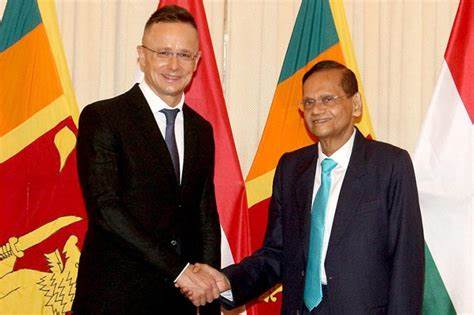
Sri Lanka has received a loan of €52 million from Hungary for infrastructure development, which includes the construction of a major flyover despite the country banning imports of cars in 2022.
The loan granted to the Sri Lankan government is set to be used for the construction of flyovers In Kohuwala and Gatambe, despite development drastically lagging behind across the North and East of the Island and a worsening foreign currency crisis which has forced the country to ban a number of imports, including cars, to conserve US dollars.
The announcement of the loans comes following a visit from the Hungarian Minister of Foreign Affairs and Trade Péter Szijjártó. Commenting on the visit the Minister for Foreign Affairs G.L Peiris expressed Sri Lanka's keen interest to deepen the bilateral relationship between the two countries.
A statement released by the Foreign minister office notes,
"The two Ministers had productive discussions on a multitude of areas of bilateral interest. Minister Peiris noted with appreciation Hungary’s empathetic approach towards Sri Lanka in addressing residual issues of reconciliation, and apprised the Hungarian Minister on progress in reconciliation and the credible domestic framework in process to promote and protect human rights, in keeping with the country’s international obligations. Minister Peiris also noted that Hungary is a member of the European Union (EU), with which Sri Lanka maintains an important and abiding partnership"
The two Ministers highlighted the importance of broadening and deepening economic relations, including the promotion of trade, investment and tourism ties in the current global context. Towards this end, the two Ministers agreed to convene the second session of the Sri Lanka-Hungary Joint Commission on Economic Cooperation (JCEC) at an early date this year.
Peiris referred to the need to optimise utilisation of the EU GSP plus facility in accessing the Hungarian market, as Sri Lanka’s key exports benefit from duty-free access to the EU market. Interest was also expressed in the early conclusion of the Double Taxation Agreement between the two countries, as well as cooperation, inter alia, in science and technology, Ayurveda and renewable energy. Though Peiris hopes of utilising the preferential trade agreements GSP+ within Hungary might be premature as both countries run the risk of losing favour within the European Union due to their appalling human rights record and increasingly authoritarian governments.
An unusual alliance though both countries hold many similarities; Hungary under Prime minister Orban has come under increased criticism from members across the European Union who argue the "leader has overseen the dismantling of democratic institutions, exerted undue control over the judiciary and facilitated widespread corruption", The Independent reports. Critics have also highlighted Orban's changes to election laws, seizures of large swaths of media and access to superior financial resources as having created an "uneven playing field" within the political landscape.
Sri Lanka's President has similarly faced criticism for overseeing the dismantling of democratic institutions within the country and compromising the independence of the judiciary. The Rajapaksa regime has also accelerated the rampant militarisation across the North-East of the island and proceeded over numerous human rights violations which have disenfranchised and targeted the Tamil and Muslim communities found across the North-East of the Island.
Read more at the Island
We need your support
Sri Lanka is one of the most dangerous places in the world to be a journalist. Tamil journalists are particularly at threat, with at least 41 media workers known to have been killed by the Sri Lankan state or its paramilitaries during and after the armed conflict.
Despite the risks, our team on the ground remain committed to providing detailed and accurate reporting of developments in the Tamil homeland, across the island and around the world, as well as providing expert analysis and insight from the Tamil point of view
We need your support in keeping our journalism going. Support our work today.
For more ways to donate visit https://donate.tamilguardian.com.

